|
Deus Caritas est: God is Love. How many times have we heard this simple yet profound theological truth in a homily, story, or teaching? How many times have we taken this for granted? In a world where truth often seems subjective, God’s love remains a refreshing and comforting constant in the Christian life. If this were not so, for what purpose, let alone by what means, would you or I exist? It is this perfect love of God which sustains us each and every moment of eternity. In fact, it’s God’s very nature, so bursting with love, that wills us into being. So too must our love for our neighbors guide and give purpose to our lives. The liturgical season of Lent is an especially wonderful opportunity for us to reorient ourselves towards God’s love and mercy. As we prepare to celebrate the ultimate expression of love the world has ever known this liturgical season, we may give up something we fleetingly desire in order to be made more aware of our need to depend on the One Love, the True Love, the Infinite Love. Of course, we can do more throughout Lent, but take to heart the suggestion of my bishop: [T]his Lent, fast and abstain when the Church requires it; give something up to make room for God and his mercy to fill you. Pray more and pray deeply and whenever you can because God listens to you: prayer puts you in touch with God and his mercy. Do something good for someone else every day; resolve to care about someone else every day, because God does, Jesus does and wants you to be like him, loving and full of mercy. Don’t make this Lent a complicated regimen of resolutions and promises that will unravel a week from now. Make it simple. Make it real. [emphasis added] Lent is not a time of self-pity or bemoaning our spiritual shortcomings. To fail to acknowledge God’s willingness to have mercy and forgive the sinner of his or her faults places sin as the end without further hope of relief, restricts one’s view of God as having limits on his love, and risks committing a sin against the Holy Spirit (i.e. believing that the magnitude of a sin is greater than God’s power— and continuous willingness— to forgive [cf CCC 1864]). While Lent brings to mind the classic images of sackcloth and ashes, the Lord desires something much more personal than just the recognition of our sins—“sincere, heartfelt repentance, change of heart, conversion” is what each of us is called to offer the Lord with the same Love He offered to those He encountered in His earthly ministry and ultimately from the Cross. “I desire mercy, not sacrifice,” our Lord, echoing the words of the prophet Hosea, declares to the Pharisees during the calling of Matthew (cf. Hosea 6:6) For us today, these words still ring true. Lent is not an easy time, but it invites us to shake us out of our spiritual complacency if we are to answer the Lord’s call to conversion. This may be uncomfortable. Receiving the ashes on our foreheads tomorrow, however, signifies our commitment to God that we will endeavor each day—and not just until Easter Sunday—to change our lives to be (once again) oriented towards God in avoidance of the sin and distractions which lead us away from His love. While we seek forgiveness from God, we are also to freely forgive others, “And forgive us our debts, as we also have forgiven our debtors.” Even if we fall along the way, the important thing is to pick ourselves up and start again— the Lord is patient! In closing, let us reflect on a final word from the Venerable Fulton Sheen: God loves you despite your unworthiness. It is His love which will make you better, rather than your betterment which will make Him love you. … Say to yourself over and over again, regardless of what happens: “God loves me!” And then add: “And I will try to love Him!” (Fulton Sheen, Remade for Happiness: Achieving Life’s Purpose through Spiritual Transformation (San Francisco: Ignatius Press, 2014), 187, 25.)
0 Comments
 Sometimes it is not one or the other, but rather both/ and. I have been thinking and praying about this a lot over the last two weeks. I live on Capitol Hill in Washington D.C. and have witnessed some of the largest marches and demonstrations that I have seen in the last twenty years. I’ve also been reading a lot of signs that the marchers and protesters carried. If you looked only at the signs, you would think we live in a world defined by competing principles and all of us are being called to take sides and battle it out until one side goes down in defeat. This serves no one well.Some of our most volatile issues of the day are not a battle of competing goods, but rather a battle that accepts no middle ground. We often lack the humility to recognize we might actually be talking about complementary principles and goods. For example, take the question of immigration. Most people would agree that a country has a right to secure its borders and most people agree that we have an enormous problem at present where many people’s homelands have become unlivable. Most people would agree that people have a right to seek justice and peace, in a safe community. It seems the discussion we should be having is how we manage to control our borders and respond to the need for safe passage to safer communities for millions of refugees who are displaced from their homelands. Who is having that conversation? Well, the Catholic Church, for one! Our faith is grounded in balancing in a life-giving creative way the tension of both/and. After all, we talk about how belief is rooted in faith and reason. We believe that justice should be wrapped in mercy. We know that with sin, there is always the possibility of grace. This ability to see the complementary goods has never been on bigger display than this past week. The week began with the United States Conference of Catholic Bishops issuing a strongly worded statement opposing President Trump’s executive order on Immigration. They write “We strongly disagree with the Executive Order’s halting refugee admissions. We believe that now more than ever, welcoming newcomers and refugees is an act of love and hope.” Here the Church draws on its principles of Catholic Social Teaching which holds both the right of people to migrate to “sustain their lives” and the right of a country to “regulate its borders and control immigration” (Catholic Social Teaching on Immigration and the Movement of Peoples). In the same week, many bishops and Catholic Pro-Life marchers welcomed the presence of Vice-President Pence who supports the work of the Pro-Life Movement. The Church both preaches against the sin of abortion and the right of every woman to have all the support she needs from the government and community to bring her child into the world. The Church will continue to advocate against abortion and, through ministries like Project Rachel, offer healing and hope to women and men touched by the experience of abortion. These two issues in the span of a week, highlight what many people find so confounding about the advocacy of the Catholic Church on behalf of social issues. We seem to some to be “always changing sides.” And that is just it, we don’t take sides. We stand in the truth of the Gospel of Life. Rather than getting tied up in political platforms and ideologies, the Church looks to the Gospel and in the harmony of truth and reason seeks always and everywhere to protect the dignity of the human person through the exercise of mercy and justice. Now, more than ever, our country needs the wisdom of a church that can navigate toward the common good by exercising both/and. We need to identify the common good within the issues on which we are so quick to take sides– and work together toward a shared good. What does a country look like that has a secure border and the ability to welcome people seeking peace, a job, a place for their children to thrive. What do support networks look like that would say we are a community who know women deserve better than having to choose an abortion and can provide for their care. What does a country look like that can promote the dignity of the human person and the common good of the community? These are questions that the Church has thought about for centuries and has some wisdom to share. Pope Francis believes that sharing that wisdom is part of our mission to the world today. He writes in The Joy of the Gospel, “Despite the tide of secularism which has swept our societies, in many countries – even those where Christians are a minority – the Catholic Church is considered a credible institution by public opinion, and trusted for her solidarity and concern for those in greatest need. Again and again, the Church has acted as a mediator in finding solutions to problems affecting peace, social harmony, the land, the defense of life, human and civil rights, and so forth. And how much good has been done by Catholic schools and universities around the world! This is a good thing! (65). Today, we all have an opportunity to bring this good thing to bear in our conversations and in our advocacy. Let’s be one of those schools! This post was originally published on the St. Joseph's College of Maine Theology Blog and was re-published with permission.
As we remember Rev. Martin Luther King Jr. on this American federal holiday, I invite you to join me in reflecting on his dream for the United States and for the world. Rev. King fought for equality and justice in the United States using nonviolence. He helped empower American society to look past differences and come together through love by leading people in prayer and using words paired with non-violent actions. As a Baptist minister, Rev. King upheld Christian ideals and spoke to the hearts of all those facing injustice. He personally felt and lived through discrimination and had his share of fear and uncertainty. Yet through these hardships, he led others to see truth in justice and civil rights by organizing non-violent marches and protests, and by preaching unity.
Much of what Rev. King said through his words and his non-violent actions can be compared to the teachings of Christ. In the Gospel of John, for example, Peter tries to defend Jesus from a large crowd trying to arrest him in the Garden of Gethsemane. Jesus tells Peter to “put the sword in its sheath” and in Matthew’s Gospel adds, “all those who take up the sword shall perish by the sword.” In doing so, Christ tells Peter that fighting back with the same means as the enemy will get him nowhere. Earlier in Matthew’s Gospel, while he was preaching about the Beatitudes in the Sermon on the Mount, Jesus reminded his disciples, “You have heard that it was said, ‘Love your neighbor and hate your enemy.’ But I tell you, love your enemies and pray for those who persecute you, that you may be children of your Father in heaven” (Matthew 5:43-45). Christ preached forgiveness through love and mercy throughout his ministry and demonstrated this in a powerful way throughout his arrest and Passion. Jesus demonstrated how love can change hearts and save lives. Martin Luther King Jr. imitated this response. His promotion of unity has had powerful repercussions on our society that are still felt to this day. Unfortunately, discrimination in various forms continues. Our next generation sees pain, division, and fear in the news and TV shows, on social media, and even sometimes right outside their doors. However, those who cultivate empathy for others can make Rev. Martin Luther King Jr.’s dream come true today and breathe life into Christ's teachings in the Gospel. So how can you empower the nation with love? How can you teach through your actions how to live out Christian values and Catholic Social Teaching? In what ways can you help bring understanding and empathy to others? I invite you to reflect on the Beatitudes from Jesus’ Sermon on the Mount (Mt. 5:3-10) as a way to embark on this journey toward building peace! “Now when Jesus saw the crowds, he went up on a mountainside and sat down. His disciples came to him, and he began to teach them. He said: 'Blessed are the poor in spirit, for theirs is the kingdom of heaven. Blessed are those who mourn, for they will be comforted. Blessed are the meek, for they will inherit the earth. Blessed are those who hunger and thirst for righteousness, for they will be filled. Blessed are the merciful, for they will be shown mercy. Blessed are the pure in heart, for they will see God. Blessed are the peacemakers, for they will be called children of God. Blessed are those who are persecuted because of righteousness, for theirs is the kingdom of heaven. Blessed are you when people insult you, persecute you and falsely say all kinds of evil against you because of me. Rejoice and be glad, because great is your reward in heaven, for in the same way they persecuted the prophets who were before you.” Please visit our website to learn more about Cultural Diversity, Catholic Social Teaching and Christian Unity. Over the past week (November 13-19), many parishes in America have been celebrating National Bible Week, annually organized by the United States Conference of Catholic Bishops to help us grow deeper in love and knowledge of the scriptures in service of our faith. It’s also a fitting way to cap off the Jubilee of Mercy which officially ends on November 20. To commemorate the occasion, the bishops have chosen as the week’s theme, “The Bible: A Book of Mercy.” The Bible is not just a moral guide, a historical document, or literary achievement. While it may be all those things, it’s so much more for us as Catholics. As the Catechism states, the Bible is where “the Church constantly finds her nourishment and her strength” (CCC 104). I’d like to reflect on three areas in the Word of God where we can all find nourishment: prayer, study, and mission. Prayer “When you read the Bible, God speaks to you; when you pray you speak to God”. – St. Augustine The same Holy Spirit who inspires the scriptures also awakens the desire in our hearts to pray. In my experience, it’s often the case we hear (rightly) about the importance of reading and praying with the Bible, but we’re not exactly sure how to do so. That’s where the time-tested practice known as Lectio Divina, or “Sacred Reading,” is a truly wonderful spiritual gift to the Church. Pope Emeritus Benedict XVI made a special point of mentioning lectio divina in Verbum Domini, n.86-87. Just a couple of weeks ago, I shared the method of lectio divina with the RCIA class I lead and challenged them to give it a try. The next week, one of the participants said how much it helped his experience of praying with the Bible, especially how to begin and conclude a time of prayer, and how to spend the time between. If you don’t know where to start or passage to choose, try just using the Gospel of the day in the Church’s calendar of readings at Mass. That’s a great way to provide continuity day-to-day as well as connect us to the prayer of the universal Church. Study “Ignorance of scripture is ignorance of Christ.” – St. Jerome While it’s certainly true that knowing about Jesus is not the same as knowing Jesus, the saints and great teachers of the Church through the ages constantly testified that a faithful study of the Bible leads to real intimacy with God. Undertaken in a spirit of humility and truth, study is even an act of love. In this spirit, the USCCB highlights that this year marks the 51st anniversary of the Second Vatican Council’s Dogmatic Constitution on Divine Revelation, Dei Verbum, which was a monumental statement on the place of the Bible in the life and teaching of the Church. National Bible Week provides us with a good reason to read Dei Verbum, or at least part of it. If you don’t have time to read the whole thing, check out the first section on “Revelation Itself”. It contains the essential foundation of our faith that God is the source of all revelation and that “through divine revelation, God chose to show forth and communicate Himself and the eternal decisions of His will regarding the salvation of men” (n. 6). In other words, if we want to know the Lord’s will for us, we have to turn to the scriptures. Mission “Faithfulness in mercy is the very being of God.” – Pope Francis In Pope Francis’ Wednesday catechesis series quoted above, our Holy Father makes the point that the Bible is truly a book of mercy, and that mercy is always accompanied by a call to mission. The words of scripture resist our all too human and artificial attempts to separate beliefs from action. One of the things my bishop, Archbishop Lori of Baltimore, is fond of repeating is, “Just because it’s the end of the Year of Mercy does not make it now the Year of Judgment or Severity!” If we lose contact with the words of scripture, we run the risk of losing touch with the concrete Corporal and Spiritual Works of Mercy that the Bible continually challenges us to make an everyday part of our lives. If you are looking to go deeper in the Bible or just need help getting started, you can check out the great resources available at places like the Catholic Apostolate Center Prayer and Catechesis page and the USCCB’s National Bible Week website to help guide your journey. Mercy. It seems simple enough. If I condescend to offer you understanding and even compassion, then I am being merciful, right? That is pity, not mercy. Mercy provides us with the opportunity to offer love of God through love of neighbor. We also experience mercy from God who calls us to move beyond self and sin and live lives rooted deeply in the experience of the love of God which calls us to always more as St. Vincent Pallotti would say. Growing in the virtue of mercy takes time and experience. We grow in mercy through not only our experience of mercy from God, but also our living it through the Works of Mercy. The Spiritual and Corporal Works of Mercy give us many opportunities to live mercy in our daily lives. Over the course of this Jubilee of Mercy, I had the opportunity to pass as a pilgrim through the holy doors at various churches, including the four Papal Basilicas in Vatican City and Rome and the National Holy Door at the Basilica of the National Shrine of the Immaculate Conception in Washington, D.C. Passing through a door does not make us more merciful, even if we have done all that is required for a plenary indulgence. The door is simply symbolic of crossing the threshold into a way of living as a pilgrim in this world – mercy lived. Mercy lived does not permit others to be taken for granted, marginalized, or discriminated against from conception to natural death. Mercy lived moves us into places, spaces, and moments where others may be timid, fearful, or disdainful to tread or do so only out of condescending pity rather than moved by love of God and love of neighbor. Mercy lived witnesses Christ in everyday life in ways large and small, wherever and with whomever we find ourselves. No one is exempt from the Mercy of God as Pope Francis just taught again this past Saturday: “Dear Brothers and Sisters: In this, the last of our special Saturday Audiences for the Holy Year of Mercy, I would like to stress the importance of inclusion. God’s mercy, which excludes no one, challenges us to be merciful and open to the needs of others, especially the poor and all those who are weary and burdened. We, who have experienced that love and mercy, have a part to play in his saving plan, which embraces all of history. In his mercy, God calls all men and women to become members of the body of Christ, which is the Church, and to work together, as one family, in building a world of justice, solidarity and peace. God reconciled mankind to himself by the sacrifice of his Son on the cross. He now sends us, his Church, to extend that merciful embrace to our brothers and sisters throughout the world. The arms of the great colonnade surrounding this Square symbolize that embrace. They remind us not only of the Church’s mission to the human family, but also of our own call to bear faithful witness to God’s inclusive love through the mercy, love and forgiveness we show to others.” This is Mercy Lived!
Have you ever heard of St. Vincent Pallotti or Pallottine spirituality? If not, you are certainly not alone. Unfortunately, not many Catholics in North America have ever heard of St. Vincent Pallotti. As a lifelong Catholic, I myself was not introduced to St. Vincent and his spirituality until three years ago, which is unfortunate because Pallottine spirituality is a great gift to the Church. You may be wondering: what exactly is Pallottine spirituality and why is it important? While I could explain, I think our Holy Father does a much better job.
On October 10, 2016, during a private audience with members of the General Assembly of the Society of the Catholic Apostolate—the society of priests and brothers St. Vincent founded, Pope Francis stressed that, “in this Holy Year of Mercy, I like to remember that Vincent Pallotti was blessed to recognize that Jesus is the Apostle of the Father, rich in mercy and full of mercy. He is the one who fulfills its mission by revealing to everyone the tender love and the infinite mercy of the Father.” During the audience, Pope Francis also urged St. Vincent’s sons to continue their special mission to help Catholics “rediscover the immense love of God.” Pope Francis’ affirmation of the special mission of the Pallottines clearly demonstrates how necessary Pallottine spirituality is today. Additionally, our Holy Father also explained that one of the major aspects of Pallottine spirituality is rooted in a personal encounter with Christ’s infinite love and infinite mercy. The Holy Father said: “Your founder realized that in order to live in communion with God, Jesus Christ must be put at the center.” St. Vincent’s personal encounter with Jesus Christ’s infinite love and infinite mercy changed his life. It impelled him to action, to spread Christ’s love and mercy to everyone. St. Vincent spread Christ’s love by providing spiritual direction, spending hours in the confessional each week, promoting various Catholic devotions, and assisting all the baptized in coming to know their vocations to the apostolate. His encounter with Jesus Christ was truly at the center of his life. Like St. Vincent, a personal encounter with Christ can help us to revive our faith, rekindle charity, and assist all the baptized in understanding their vocations as apostles. Sounds pretty awesome right? I think so too. I will now explain three practical ways to infuse Pallottine spirituality into your ministry.
The need has never been so great; the task has never been so urgent. We all thirst to encounter God’s infinite love and infinite mercy. We all need St. Vincent Pallotti’s message and we can all work to spread it in our own ways. The question is—will you join us? For more resources on St. Vincent Pallotti and Pallottine spirituality, click here. Can you imagine yourself as one of the apostles? Put yourself in their shoes. You were moved by Jesus. His teachings spoke to your heart. When you were with him, you felt incredibly alive, free, loved and full of hope. No one persuaded you; you wanted to follow him. You were there when Jesus fed the 5,000, gave sight to the blind, and raised a young man from the dead. He received a royal welcome into Jerusalem. You celebrated Passover with him. You were also there when the soldiers came and dragged Jesus off to be crucified. Scared for your own life, you hid in the shadows abandoning him to death on the cross. You were a puddle of fear, sadness, anger, and despair. You disgust yourself. Disoriented, you stumble upon the others. You look to Peter but that rock is crushed, broken by grief and disbelief. The Sabbath comes and goes. It’s over—time to pick up the pieces of your life and move on. But just as you begin to leave, two female disciples arrive with astonishing news. Jesus is alive! Remember the mountain in Galilee? Remember what he said? Go there and you will see him. Of course, you go. You gather with the other disciples and make arrangements for the journey. It will take four days. Along the way, you cry, confess, and tell stories. You see the mountain in the distance. A lone person is descending from the top. Before you know it, Jesus is approaching you. You are gaping-mouth-open astonished. Some fall down to worship him. Others cannot believe it. Peter collapses to his knees. And still, Jesus approaches. He embraces you. You are alive again. Jesus reaches out to everyone. He turns to Peter last, lifting him up, restoring his strength. Jesus calls you together. "All power in heaven and on earth has been given to me. Go, therefore, and make disciples of all nations, baptizing them in the name of the Father, and of the Son, and of the Holy Spirit." He pauses here, letting his eyes meet each one of us. Some of us are giddy with joy, others cannot stop the tears. "Teaching them to observe all that I have commanded you." Suddenly, your heart begins to burn within you. You have a lot to say, a lot to share, a lot to tell. You remember with crystal clarity everything he taught, every moment he was with you, all the experiences you shared. You know now who you are and what you are about. It is time to go. But you hesitate. You want to stay. Jesus knows your heart. He is speaking again. Amazingly, he is talking to everyone and only you at the same time. "Behold, I am with you always, until the end of the age." Stay here. Stay with Jesus resting his eyes in yours. You have a lot to offer. You know who you are, what the Lord means to you, what he asks of you, and what he has given you. The stark truth of mission is hard to believe. God sends you into the world because there is something the world needs that only you can give. World Mission Sunday reminds us that we are sent to the whole world. As disciples of Jesus, there is no place or people beyond our sphere of concern. Pope Francis reminds us that mission is an "immense work of mercy, both spiritual and material." Last year, many of us “walked with Francis.” This year, let us be with Pope Francis in the mission of mercy. Let us renew our call to mission - to care about everyone, everywhere. I offer three suggestions on how to renew the call to mission:
Jesus is sending us out to all nations and he will be with us always. We will be astonished at how the Lord will reveal himself to us through mission. It is time to go. "The confession of evil works is the first beginning of good works." -St. Augustine I’ll come right out and say it: I dislike going to Confession. I really do. And so I avoid it like the plague. We all have our struggles in faith, and this is my biggest one. “Why do I have to seek out a priest, another human, and tell him all the bad things I’ve done? Can’t I just talk to God directly? Doesn’t God hear everything in your heart?” We’ve all heard these questions—challenges, really—about the need for regular visits to the confessional. After all, God does know everything in our hearts. We can talk to him directly, and we should do so often! But we need more than just that internal dialogue with God. Our faith, after all, isn’t one lived alone. St. Paul tells the Romans, “We, though many, are one body in Christ and individually parts of one another.” (Romans 12:5) I may be a toe, you may be an earlobe, but we all, collectively, make up the one Body of Christ in the Church. So if that’s what we truly believe, and one of those parts gets hurt, the whole rest of the body feels that pain. If you stub your toe, the whole of your body stops everything and focuses on that pain. So, too, when we stub our spiritual toe, we create a ripple throughout the rest of the Body. We could talk at length about the nature and effects of sin, but that’s for another discussion. The point is that each of our sins have an effect, not just on ourselves and on God, but on the whole of the Church, too. And so we have three people or groups to reconcile with when we’ve sinned: ourselves, our Creator, and the larger Body of which we are each a part. And who better to forgive our sins than a priest? He’s a spiritual father, a representative of the Church, and, most importantly, someone who acts “in persona Christi,” or “in the person of Christ.” By virtue of his ordination, each priest has been given some pretty awesome powers. He can baptize people, he can bless places and things, he can call down the power of God onto simple bread and wine, miraculously turning it into Christ’s Body and Blood. So if he can do all those things, can’t he also exercise the power Christ gave the Apostles after his Resurrection? “Whose sins you forgive are forgiven them, and whose sins you retain are retained.” (John 20:23) That’s crazy! But it’s our faith, and it comes from Christ himself. We profess this in the Apostle’s Creed: “I believe…in the forgiveness of sins…” Now we’re all thinking, “Okay, that’s all well and good, but Confession is still too uncomfortable.” And you’re right! It is. That’s why I dislike going. I don’t like being uncomfortable. I don’t like to acknowledge the messy parts of life, including my own failings and shortcomings. I don’t like to admit that I’m wrong, especially when I keep doing the same wrong thing over and over again. But every time I finally buck up the courage (sometimes after months or years) to walk into a confessional, I’m never disappointed. The result is always the same: God has forgiven me and wiped the slate clean. And I feel so good about it! It’s not that I’m afraid of God’s mercy. In fact, I crave it. The problem is that I’m too afraid of my own self, of my own fragile and broken humanity, to even ask for this mercy. In my heart of hearts, I don’t believe I deserve it. And that’s the thing: none of us deserve it. Not one of us can ever be sorry enough, contrite enough, penitent enough, to make amends for what we’ve done and continue to do over and over again. We can never fully make it up to God; that’s why he sent his Son. Jesus took the sins of the whole world on his shoulders, beaten and bloodied though He was, until he became sin itself: “For our sake he made him to be sin who did not know sin, so that we might become the righteousness of God in him.” (2 Corinthians 5:21). He took every sin each of us will ever commit, carried them up on the cross, and died as payment for it. He’s already paid the price for us. It’s like a spiritual gift card that never expires, but we have to use it to take advantage of the gift. That’s why Confession is so important: the mercy is guaranteed; we have but to ask for it. Pope St. John Paul II once said, “Confession is an act of honesty and courage - an act of entrusting ourselves, beyond sin, to the mercy of a loving and forgiving God.” In this Jubilee Year of Mercy, may we all be honest and courageous enough to do that. Whether you just went to Confession last week or, like me, have been putting it off for way too long, be courageous and just go. Let the Year of Mercy have some personal meaning for you, and let God forgive you for what He’s already paid for upfront. For more resources on Confession and the Jubilee Year of Mercy, please click here.  Who was it that claimed the Church is irrelevant to young people? Who was it that claimed young people did not seek or yearn for Christ? My experience of World Youth Day (WYD) has shown me otherwise. WYD is the largest gathering of Catholic young adults in a series of events sponsored by the Church. First initiated by St. John Paul II in 1985, WYD is celebrated at the diocesan level annually and at the international level every two to three years at different locations around the world. People do not attend as tourists, but rather as pilgrims, since the nature of the composite events are religious in character. Typically, pilgrims will arrange lodging in the host city before participating in the opening ceremonies, catechesis, and cultural exhibitions. Taking advantage of all the host city has to offer, pilgrims will usually also spend time exploring the region (especially churches), shopping for religious souvenirs, and tasting the local cuisine… and very rarely alone! As the locals are quick to notice, the host city will be absolutely inundated with pilgrim groups, each identified by various flags, shirts, and chants. In spite of the inconveniences experienced (such as crowds, traffic, and long lines), for the most part, the locals are excited to greet so many peoples; local businesses are especially happy to cater to the pilgrims’ needs. The focus of WYD events centers around the arrival of the pope: everyone wants to hear what the Holy Father has to say to the young pilgrims at various sites and events. Traditionally, the Holy Father will address crowds from his residence, during Masses, Stations of the Cross, and the overnight vigil during which millions camp out together in prayer. The conclusion of the Vigil Mass the following day signals the end of the official WYD program, though at that time the next host city is formally announced. I’ve been blessed to have been able to attend two World Youth Days, in Rio de Janeiro, Brazil in 2013 and in Kraków, Poland this year. So much more than a sightseeing trip, WYD for me has been all about seeing how God’s love for us manifests itself in each culture. Encountering millions of young believers (in addition to curious observers) who are inherently joyful in their witnesses to the Lord, I am especially delighted to see them interact with each other through songs, chants, prayers, and games during scheduled events or out in the streets. For me, some of the most powerful witnesses given happened outside of the official program (though seeing millions kneel before the Blessed Sacrament with lit candles during the vigil was indescribably moving). I remember seeing a group of Italian pilgrims run over to help a local disabled man carry groceries up a number of street stairs; another group immediately rushed to comfort a female pilgrim who had broken down during our 12 kilometer (about 7.5 miles) hike from the site of the overnight vigil. Simple acts of love like that really touched me as being authentically Christian: to love in even the smallest matters and, by doing so, answering the call given at the end of Mass, “Go in peace to love and serve the Lord.” Pope Francis gave many beautiful and encouraging addresses to those assembled in Poland, but I was most impacted by an action of his. At the beginning of Mass at the great Shrine of Czestochowa, Pope Francis missed a stair step and fell, thankfully uninjured. He later explained that, "I was watching (an image of) the Madonna, and I forgot the step." He literally fell for Our Lady. When I heard the news, I remembered a similar experience of my tripping on the stairs upon seeing a lovely peer of mine go by. To have that ineffably tender and peaceful focus on the Blessed Mother, to be in awe of the Virgin, reflects the perfect love God has for her and for each of us. WYD may have ended, but the mission entrusted to the young pilgrims by Pope Francis still burns in our hearts: Launch us on the adventure of mercy! Launch us on the adventure of building bridges and tearing down walls, barriers and barbed wire. Launch us on the adventure of helping the poor, those who feel lonely and abandoned, or no longer find meaning in their lives. Send us, like Mary of Bethany, to listen attentively to those we do not understand, those of other cultures and peoples, even those we are afraid of because we consider them a threat. Make us attentive to our elders, as Mary of Nazareth was to Elizabeth, in order to learn from their wisdom. May each of us always endeavor to accomplish it! To learn more about World Youth Day, please click here. For more World Youth Day reflections, please click here. I still remember as if it were yesterday. There I was—a junior in high school with my sights set on my then life’s goal of playing college soccer—listening to the doctor tell me the results of the recent X-ray: “You have a stress fracture in your left ankle.” My heart sank, and I immediately focused on the most apparent, inevitable consequence of that injury: I would have to sit out the whole season, meaning I would miss crucial recruiting opportunities. To say the least, I was discouraged as I stood before the rather large and ominous mountain that so suddenly impeded the pursuit of my goal. I instantly began feeling sorry for myself and let anger creep into my heart. Then, in what I now look back upon and gratefully remember as “the moment of mercy,” I heard God’s gentle voice speak to the depths of my heart and tell me, “Carolyn, there’s more to life than soccer.” With my heart pierced by that voice, my desire to play college soccer disappeared. I soon began making decisions that would lead me to the people and places that God had in mind for me to more deeply encounter His mercy and to discover the actual goal of my life. During my first year of college, the Lord sent a spiritual director into my life who asked me a life-changing question: “Carolyn, what is the goal of your life?” At that time, I couldn’t honestly answer, since I couldn’t yet put into words what the Lord had begun stirring in my heart through the stress fracture event. Yet, over the next few years of college as I continued spiritual direction and developed a more habitual prayer and sacramental life, the Lord began to show me the answer to the question: Communion with God—holiness—is the goal of my life, because Love is the meaning of life. In a special way during this Jubilee Year of Mercy, the Church is called to be “a living sign of the Father’s love in the world” (Misericordiae Vultus 4). At the heart of the Jubilee Year of Mercy, we find the Person of God the Father, whose love is both the origin and goal of our life. The Year of Mercy is a special time of grace in the Church, and Jesus invites us to daily re-encounter our Heavenly Father, to be renewed by His love—which alone gives meaning to our life—and to joyfully share the gift of His love with those whom the Lord entrusts to us each day. At a General Audience on December 9, 2015 (the day after the opening of the Year of Mercy), Pope Francis emphasized the purpose of the Jubilee Year: Turning our gaze to God, our merciful Father, and to our brothers and sisters in need of mercy, means focusing our attention on the essential contents of the Gospel: Jesus, Mercy made flesh, who renders the great mystery of the Trinitary Love of God visible to our eyes. Celebrating a Jubilee of Mercy is equivalent to placing once again the specific nature of the Christian faith, namely Jesus Christ, the merciful God, at the center of our personal life and that of our communities. In other words, Pope Francis is saying that the invitation during this Jubilee Year of Mercy is to “return to the basics” of our faith: to enter more deeply into the mystery of the Holy Trinity, which is “the central mystery of Christian faith and life” (CCC 234). In fact, Pope Francis begins his letter for the Jubilee Year with words which aim to “sum up the mystery of the Christian faith”, namely, that “Jesus Christ is the face of the Father’s mercy” (Misericordiae Vultus 1). Jesus’ whole earthly mission was to reveal the truth about God’s inner life of love and man’s vocation to that love that originates from the Father’s heart (John 17:3; CCC 514-518). This is why Jesus tells Philip, “He who has seen me has seen the Father” (John 14:9). Everything Jesus says and does reveals the Father (CCC 516) and aims at “restoring fallen man to his original vocation” (CCC 518) of love. Thus, the Jubilee Year of Mercy is a special moment of grace to daily re-orient the gaze of our hearts towards the merciful gaze of the Father that tenderly awaits us. This gentle and loving gaze of the Father reveals the love that alone is the origin, goal, and meaning of our life. As Pope Saint John Paul II says, “Man and man’s lofty calling are revealed in Christ through the revelation of the mystery of the Father and His love” (Dives in misericordia 1). May we live this Jubilee Year by creating the space in our daily lives—particularly through prayer and frequent reception of the Sacraments—to encounter Jesus and to let our merciful Father love us. We ask Mary, Mother of Mercy, to help us open our hearts and be more receptive to the Father’s love. May we give her permission to use us as instruments of God’s mercy in the lives of others so that we can share the gift of His love with those whom God entrusts to us. As I was walking down the sidewalk to my residence hall, I glanced at my watch and realized I had a busy night ahead. I still had class until the evening, had to eat dinner, meet with a resident, prepare for next Monday’s program about how faith enriches our relationships, and study for two exams the next day. When I unlocked the door to my room, I realized I had about fifteen minutes until my next class. I thought to myself that it would be a good time to quiet myself and pray. I decided it would be easier, since I was rushed, to quickly recite a couple of prayers rather than expend the necessary effort to examine my day or truly open my heart to God, the Infinite Love. My principle concern at that moment was to check daily prayer off my to-do list. I felt rather empty for the rest of the day and struggled in my ministerial responsibilities. I lacked authentic prayer in my day and it took its toll. While authentic prayer can be hard, especially for those of us involved in ministry, authentic prayer empowers us to fulfill the mission Christ entrusted to us. Yet, what exactly is authentic prayer?
During a homily in the chapel of the Santa Marta residence in 2013, Pope Francis stressed that “the Lord tells us: 'the first task in life is this: prayer.' But not the prayer of words, like a parrot; but the prayer, the heart: gazing on the Lord, hearing the Lord, asking the Lord.” Pope Francis astutely observed that authentic prayer is integrally connected to the heart, the Sacred Heart of Christ, and our own hearts. When we engage in authentic prayer, we are opening our hearts to the transforming infinite love and mercy of Jesus Christ. We are being honest with God about the desires of our own heart. While authentic prayer is certainly beneficial for our own selves, being practitioners of authentic prayer also is a gift to the entire Church. Others notice God using us sinful creatures as His instruments. Our lives become signs that point towards the Kingdom of God. Yet, we must each reflect on how tempting it is to imitate a parrot in our prayer. How often do we recite prayers to cross them off of our to-do list, having little faith that the Lord will answer them? Asking God to open our own hearts to His infinite love combats this temptation. If I had taken the time to really open my heart to God, to be honest in my prayer and not dress it up, I would not have struggled with my ministerial responsibilities. When we become men and women of authentic prayer, Christ transforms our hearts after His own heart. Thus, we are empowered by the Holy Spirit to be humble heralds of the infinite love and mercy of Jesus Christ. For more resources on prayer, click here. This time of the New Evangelization in the Church is beautiful: all the faithful are called to spread the love of Christ to the hearts of modern men and women. While the term New Evangelization, though beautiful, has become almost overused, common jargon within the Church, we are called to the radical joy and love the New Evangelization promotes. The task seems lofty at first glance. With controversies of all sorts in society today, the charge to love like Christ is even greater. However, the Body of Christ has been in trying times throughout the ages, and it’s the ability of holy men and women to magnanimously love that makes a difference in society. Today, the Church celebrates a saint that is a perfect example for the faithful of living out the call of the New Evangelization: St. Philip Neri, the Apostle of Joy. St. Philip Neri, a radical saint of the 16th Century, was known for his humility, obscure and hilarious means of mortification, pastoral care, humor, and charm. The legend and stories of St. Philip Neri are plentiful and cannot all be spoken of in this short post, but his charity is worth mentioning for those who are attempting to live out the call of the New Evangelization. Philip was known to have a strong devotion to the Holy Spirit. At the age of 29, before the feast of Pentecost, Philip was praying for a special outpouring of the Holy Spirit when he saw a globe of fire enter his mouth, move down his chest, and travel to his heart. At that moment, Philip experienced an immense amount of joy, as if his heart had expanded. The saint had been filled with the love of God! Throughout the rest of his life, when Philip was ministering to people in the confessional, celebrating Mass, or performing acts of charity, his heart would violently palpitate. Oftentimes, Philip would embrace his penitents and hold them close to his chest. The faithful would receive an immense amount of consolation from the embrace and this practice became known as “the most effective way of being delivered from temptation.” St. Philip Neri was known as the Apostle of Joy because his aim was love, and the Holy Spirit, the Flame of Love, was the driver in his mission. Philip died at the age of 80, dedicating his entire life to mercy, love, and joy. The many stories that follow him affirm that claim. He was dedicated to the Sacrament of Confession and would be available for Confession at all hours. Dispensing the mercy of Christ, Philip spent his last day on this side of heaven hearing confessions from the people he served and loved. Those he ministered to claim they could not be sorrowful or depressed around Philip; he exuded a constant flow of Christ’s joy. During an evaluation to determine Philip’s cause of death, the examiner found Philip’s heart to be twice the size of an average heart, causing the ribs around the heart to break and curve out. The love of God had been made manifest physically within him. Today could you imagine a Church with followers whose hearts, like Philip’s, are enlarged with love for neighbor? This is the call of the New Evangelization—to spread Christ’s fragrance of love everywhere, “for we are the aroma of Christ” (2 Cor 2:15). The Church is in a unique time. Our intellectual arguments often mean little, but our actions and witness of love are powerful. The New Evangelization calls us to be little Apostles of Joy. Wherever we are and wherever we go, we are to love. Cardinal Ratzinger explained that evangelization is teaching people the path to happiness. “To evangelize means: to show this path—to teach the art of living,” he said (Address to Catechists and Religion Teachers, 12 December 2000). St. Philip Neri taught those around him the art of living a joyful, humble life, motivated by the love of Christ. To live the New Evangelization, we are to have a heart like his, witnessing and walking with others and teaching the art of living. The Body of Christ must be propelled by the love of God. Today, let us invite the Holy Spirit into our hearts in a deeper way so we might gain a greater capacity to love like our joyful friend, St. Philip Neri. May we be a people of love with enlarged hearts for Christ, spreading joy to all. “The love of God makes us do great things.” –St. Philip Neri For more resources on the New Evangelization, click here. Tomorrow the Church celebrates St. Catherine of Siena, a 14th century tertiary Dominican and Doctor of the Church, who is renowned for her ardent prayer, peacemaking, and writing. Her life is filled with stories that reflect a transparent faith in the power of God’s intervention, her desire for unity within the Church, and her gifts in healing and touching the lives of others.
I discovered St. Catherine a few years ago when I read this passage. She writes these words with the same devotion and absolute trust with which she lived her life by: “I don’t want you to yield to weariness or confusion, no matter what may trouble your spirit. No, I want you to keep the good, holy, and true faithful will that I know God in his mercy has given you. Be glad…celebrate! Without any slavish fear take courage. Don’t be afraid, no matter what has happened, no matter what you see coming. Take courage for perfection is very accessible” (excerpt from her Letter to Br. Raimondo of Capua at Avignon). Whenever I read these words, they indicate to me that St. Catherine must have experienced trials herself and had her faith tested. Don’t we all struggle with weariness or battle the armies of confusion? St. Catherine doesn't want us to get caught up in the messiness of our sins and plights but rather in the will of God that will lead us through our struggles. The reason we should "be glad and celebrate" is because God's will is there to guide us through the midst of it all. And this, as St. Catherine reminds us, is a wonderful gift of God's great mercy, which is able to penetrate into our past, present, and future experiences. God’s will can sometimes seem so hard to understand, a mystery that is more hidden than it is found. Many often ponder, "What is God's will for my life? and ask, "Lord, what is your will…what should I be doing?” But St. Catherine knows God's will is more simple and apparent than we think. He doesn't hide it so much as reveal it or deter us so much as lead us to it. We should “take courage” because God has revealed everything in the perfection of Christ his Son, who lived among us and entered into the human experience. He is so near, so accessible. What is God’s will for us then except to grow into the perfection of Christ? St. Paul reminds us that, “God has called [us] through our Gospel to possess the glory of Jesus Christ.” (2 Thes. 2:14) Every day we are invited to grow towards sanctity and heaven by rising with Christ in the midst of our circumstances. We are to mature in love so as to become ourselves fully in Christ. If we strive for this first, God will surely lead us down the narrower paths of our lives. God is always at work in us if only we open ourselves to him. I invite you to think and pray about your own life. How have you grown in virtue over the years? This is evidence of God’s grace alive in your heart and mind! St. Catherine points directly to Christ, the Fountain of Life that is never depleted of its mercy and compassion! In him we really can do anything. Let us then “take courage” in our lives and “celebrate” Christ and the mercy of God! We need not be afraid! Thank you St. Catherine for your life and example! Pray for us, that we can fight the good fight and become ourselves fully in Christ. May we experience deeper the reality of God’s great mercy. For more resources on the Jubilee Year of Mercy, click here. This Sunday, the Sunday following Easter, the Church recognizes Divine Mercy Sunday, a day that carries an even greater emphasis in this Year of Mercy as announced by Pope Francis. Divine Mercy Sunday is a day that carries a special significance to my family. In a few weeks, my family will mark the tenth anniversary of the passing of my grandfather, known best to his grandchildren as “Pop-pop.” He was a man of great generosity both to his family and to each of his patients, who he spent his career serving as a cardiologist. He was also a man of great faith, who in his passing left his family with the greatest gift, one of faith in God’s infinite mercy. In the months before his death, as he gradually grew weaker and his cancer spread, he found a great peace in praying the Divine Mercy Chaplet. He was especially fond of praying the chaplet in song and even when he was too weak to say it himself, family and friends would pray it with him. It was widely known that at 3pm each day the television would be tuned to EWTN so he could recite the chaplet. Providentially, a local Catholic film producer was filming a new production of the Divine Mercy Chaplet in song, entitled Generations Unite in Prayer and they were looking to film someone elderly with a devotion to this prayer. Despite concerns over my grandfather’s declining health, he was insistent on being a part of this project and doing whatever he could to help spread the message of Divine Mercy. Also known for his sense of humor, on the day of filming,, Pop-pop remarked, “It’s a good thing Jesus is the star of this show, because I don’t look so good” as the crew captured scenes of our family praying the chaplet at his bedside. Following the filming, my grandfather felt a renewed sense of determination: he wanted to live to see one more Divine Mercy Sunday. Although this was still many weeks away, by the grace of God he lived to see that day. In fact, on Divine Mercy Sunday he insisted on getting out of bed and kneeling before the image of Divine Mercy that hung by his bedside to offer a prayer of thanksgiving with the intercession of St. Faustina. He passed away two days later. I was first introduced to the Chaplet of Divine Mercy when my grandfather was ill and still today I take great comfort in its words, particularly the words to the closing prayer: Eternal God, in whom Mercy is endless and the treasury of compassion inexhaustible, look kindly upon us and increase your Mercy in us that in difficult moments we might not despair nor become despondent, but with great confidence submit ourselves to your holy will, which is love and mercy itself. When facing personal trials I’ve found a great sense of hope in this simple prayer. Hope that whatever challenges I may be facing, God will grant me the peace and perseverance to see it through. Hope that despite my imperfections as a sinner, that I too may share in the glory of the resurrection. And the prayerful hope that death did not have the final word on that April day ten years ago, and that one day our family will join Pop-pop in his eternal reward. We are often our own harshest critics. This is the case in my own life, and sometimes I look up in exasperation at God and tell Him I’m tired…of myself. In our culture of busy-ness and perfectionism, high achievement and the constant thirst for more, it’s tempting to balk at our deficiencies, cringe at our weakness, run from our blemishes. How could I have said that? Why did I fail at that again? How have I not learned? These thoughts run through our defeated minds if we forget in this Jubilee of Mercy to be merciful to ourselves. So often, we turn to shame, annoyance and frustration when we fall, sin or come face-to-face with our humanity. I imagine this is how the woman at the well felt as she went to get water at the hottest time of day. Divorced and remarried multiple times, she was seen as unclean by her Samaritan kinsmen. She avoided the other villagers at all costs in order to protect herself from their condemning gaze. There was one gaze, however, that she was powerless against: His. It was a gaze far more surprising than all others. A gaze not of condemnation, but piercing in its persistence and compassion—the gaze of love from God Himself. What must it have felt like to look up in the noon day heat and meet His gaze? What must it have felt like to be seen, known, and loved by the Son of Man? This is Christ’s eternal gaze upon all of us. If you’ve already experience it, you can relate to the Samaritan woman. If not, I invite you to look up from your well and meet Him there. How He waits for us—the Christ! How He goes out to our man-made wells of sin and shame, of selfishness and pride, of indifference and bitterness to meet His children, to remind them that they are loved! He comes to you, to me. The Lover pursues His beloved. The Shepherd pursues His sheep. The Father pursues the prodigal son. God desires us. Encountering this love and mercy leaves no room for indifference or fear. We long to reciprocate this love, as the woman at the well did. She left her jar, the very reason she came to the well, in order to proclaim the Christ to her entire town—the town she had avoided at all costs (cf Jn 4:28-29). This is radical. This is the conversion that results from the beautiful and delicate balance of love and justice, mercy, and truth. We are loved even when we have deemed ourselves unlovable. We are desired even when we remain indifferent. We are sought when we hide. And today we are being called and sent forth to bring His gaze to the nations. Why? Because we were created for greatness, though we are pilgrims living in a fallen world. We were created for life with God Himself; to live blameless, spotless, white as snow. Yet we live in a world in which we are often warring against God, ourselves, one another, and nature. In this Jubilee of Mercy, we are reminded that our scars or weaknesses should not scandalize us to the point of paralyzation or despair. We can no longer be imprisoned by our sin because we have a Savior—one who calls us to transfiguration and gives us the hope of the Resurrection, which we celebrate in 10 days. The piercing love of God elevates us to be salt of the earth, light to the nations. If we live in the certainty of being loved, we cannot refuse to be gentle and merciful to ourselves. Only in receiving His merciful love each day will we be able to love ourselves purely in the way that enables us to purely love our fallen brothers and sisters. Rather than cower at our weakness, going to the well at noon, let us embrace it—giving ourselves fully and completely to the One who can transform our weakness for His glory! May we cling to Him, not to ourselves, surrendering our folly to His wisdom, our sin to His perfection, our indifference to His love, our brokenness to His wholeness. Leave your jar at the well and go forth. For more resources to guide you throughout this Jubilee of Mercy, click here.
|
Details
Archives
July 2024
Categories
All
|
About |
Media |
© COPYRIGHT 2024 | ALL RIGHTS RESERVED

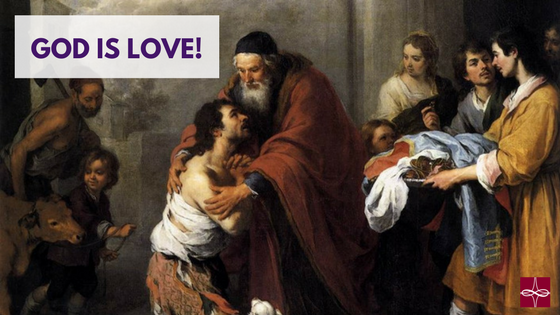

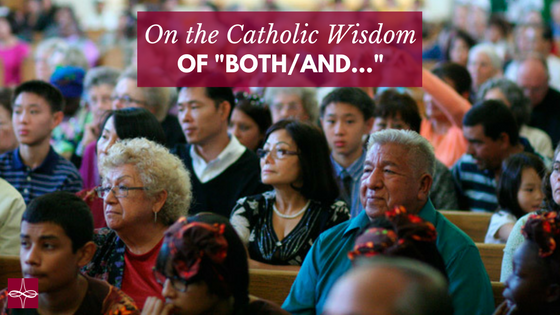

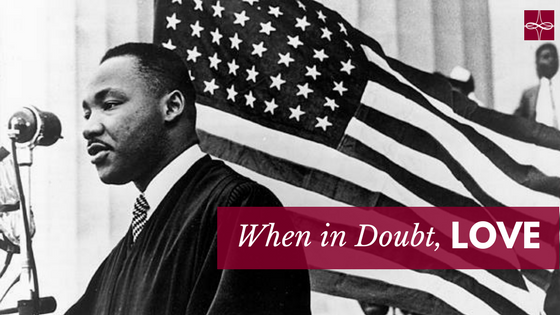

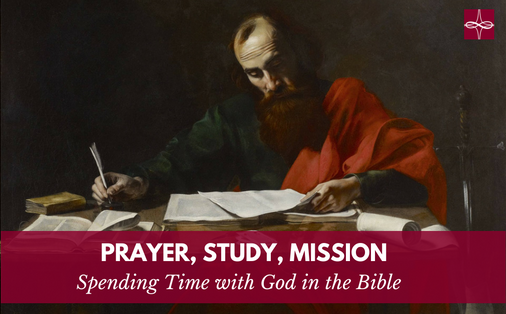

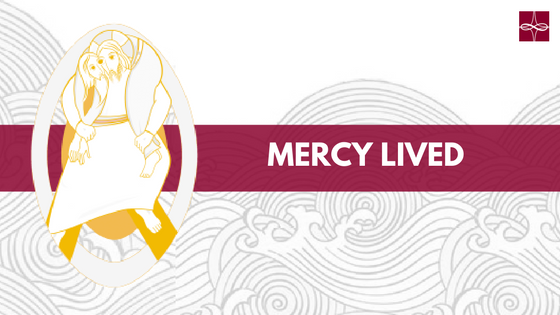
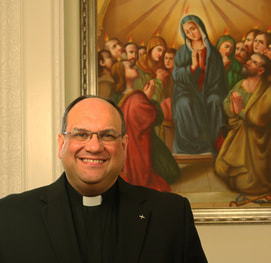
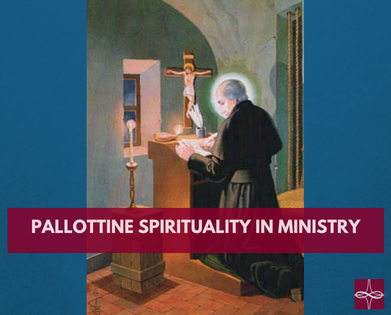



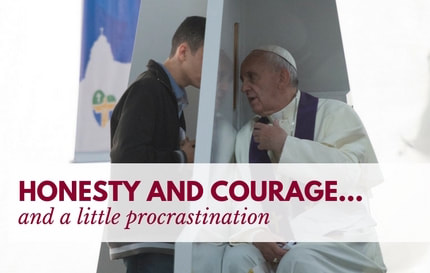


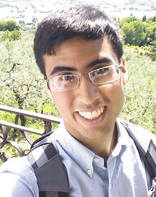
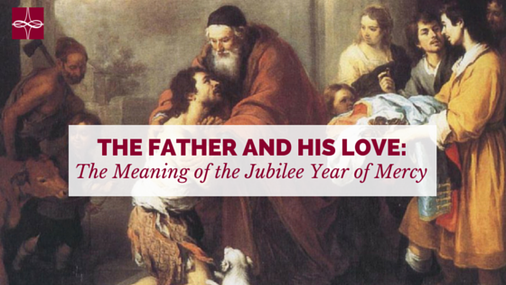

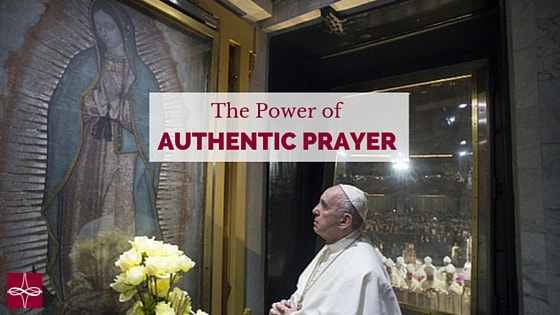

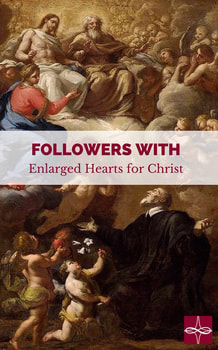

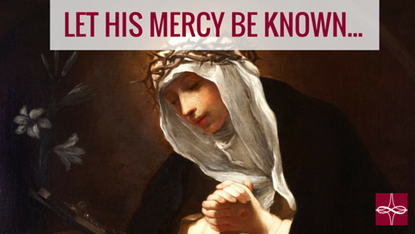

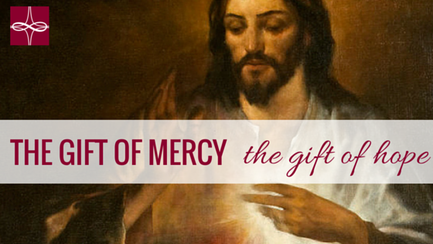



 RSS Feed
RSS Feed